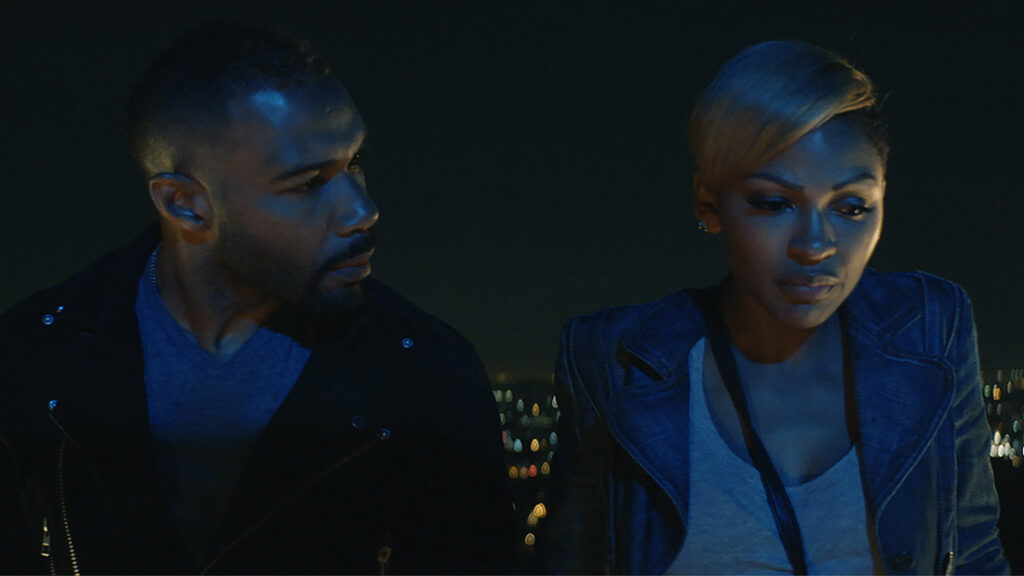In Qasim Basir’s “A Boy, A Girl, A Dream,” the male in this equation is Omari Hardwick’s depressed filmmaker Cass, a cornucopia of masculine emotions from over-aggression to sensitivity to insecurity. A minute or two into this story, he runs into a woman named Frida (Meagan Good), who is equally unstable in her life as a lawyer and a DJ, and has her own negative elements (a horrible boyfriend) holding her back. Their meet-cute takes place in one-night, as shot in one take, on the night of November 8, 2016. With the Trump election slowly looming like the Apocalypse, it’s an atmosphere of nightmares and dreams that isn’t as rich as the script thinks it is, which can make the movie more wistful than its dedication could have intended.
Good and Hardwick are compelling in this story, even when the script has gaps in giving them something interesting to say. As their strong chemistry takes them through a whole range of conversations and locations—him being too aggressive in the club, her being open about her secret music career while they drive a car, them sharing a moment looking at the Los Angeles skyline—they both display an ability to change emotions gracefully on a dime, showing the many layers of each of their fictional beings.
Producer Datari Turner confirmed to VIBE that the movie was indeed made in one-take, as shot 13 times. Though during viewing I was looking for cuts and thought I had found them, nonetheless the fluidity of the project isn’t so much a problem as how it is used. The attitude is more workman than it is artistic, and the second time we watch Good and Hardwick sit in the back of Lyft ride is less captivating than the first. For a venture like this, it’s important also to punctuate the imagery with composition that stands on its own; “A Boy, A Girl, A Dream” is too often sloppy with that, especially in its final shot that seems to be correcting its focus while it looks up at the moon.
In a wincing self-congratulatory flourish by its third act, the project becomes about a woman prompting a filmmaker to share something that’s important, creating something that feels altruistic. But this is clearly a project with its own aspirations, and it is exciting to watch those actors guide it. The film is best as a showcase of their talents, but only when it gives them something to say.

John Cho, Debra Messing and the technology of our daily lives all contribute to a gripping piece of entertainment with “Search,” which is more than prepared for an audience wider than those at Sundance. As a story that takes place entirely on screens, it’s a premise we’ve seen before (“Unfriended,” “Open Windows”) but here it has a surprising amount of heart, as it becomes about a father’s journey to learning about his daughter when she goes missing. The father in this case is played by the extremely charismatic John Cho, who is still mourning the loss of his wife a few years ago (presented to us in an effective opening scene, using the images conjured by a computer mouse and no acting). When his daughter Margot (Michelle La) vanishes randomly one day, he scours through her online life to find clues, while interacting with his brother Peter and a detective in missing persons cases.
Co-writer/director Chaganty starts with a great seed of an idea, before Cho even shows up. It’s a sharp idea of visual storytelling, accompanied by effective music and by vivid ingenuity. And for how it shows that we live through screen technology, it’s a far more inventive than cynical approach. There’s a website for every part of human interaction, whether it’s vlogs or funeral viewing services, and “Search” takes full advantage of our normalization of Facetime as well. Eventually the film involves secret cameras, YouTube videos, and Reddit pages and possibly everything you can think of, while showing how the missing persons case has become an extravaganza, with a few overzealous twists in between.
But the story builds on big developments and small details you may not notice, while creating character elements out of iMessage chat logs, or various pages. It’s a mental mystery where all the clues prove to be right there, you just have to know where to look. As an indie with blockbuster potential, it displays the type of roller coater experience that can be achieved from crafty writing and a canvas as simple as a blank screen.

“Madeline’s Madeline” is one of those movies that is guaranteed to surprise you in one way or the other. This will likely happen when you meet Helena Howard, presented in Josephine Decker’s film as a guaranteed, bonafide, just-minutes-away-from-stardom acting breakout. Her acting abilities are so wildly good that Decker has essentially made an experimental, impulsive drama about those very talents.
Howard stars in the movie as an acting prodigy named Madeline whose discordant emotional relationship with her high-strung mother (Miranda July, in one of her very best performances) is romanticized by her acting teacher, Evangeline (Molly Parker). As we watch Evangeline rehearse with Madeline along with other, older NYC actors, by pretending to be animals or improvising any possible action, the movie blends reality and fiction with actors on the stage, while cutting back to memories or nightmares about much more emotional stakes.
Thankfully and unmistakably, “Madeline’s Madeline” is far too out there to be a mere acting reel. By its storytelling and aesthetics alone, it’s the type of welcome viewing challenge that encourages a second or third dive, in order to get in its headspace. It’s beautifully unwieldy, seemingly changing its editing, camera work and musical styles throughout, while telling a story that floats but is connected to the ground by a single thread. All the while, Howard is the center spectacle, and the movie plays like a fever dream inside her new, fascinating mind.












